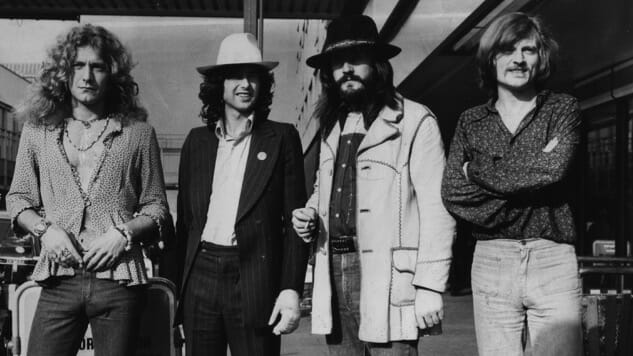Led Zeppelin Albums, Ranked

Led Zeppelin, the original hammer-swinging band of rock gods, is back—and all it took was Chris Hemsworth to pull it off. (Or is that Liam?) The English supergroup of the 1970s is now the supergroup for the 21st-century superhero set, with its stomping 1970 classic “Immigrant Song” powering the Thor: Ragnarok trailer to record downloads and entering the Billboard charts for the first time since its release. (There’s also a rumor swirling that Zeppelin may reunite for this summer’s Desert Trip Festival.)
Before it soundtracked a Marvel movie trailer, of course, “Immigrant Song” was the opening track from Led Zeppelin’s 1970 monument, Led Zeppelin III, with Robert Plant’s banshee wail heralding a new era of hard rock and metal. For all its innovation and impact, though, few fans rank Led Zeppelin III as the band’s finest hour. But now that it’s back on the air and seducing a new generation of listeners, perhaps it’s the perfect time to revisit the group’s catalogue and sort it out for an audience eager to explore Zeppelin’s legendary 11-year recording career.
Here are all of Led Zeppelin’s albums ranked, from their 1968 debut to their 1982 swan song, Coda.
10. The Song Remains the Same (1976)
This live, two-disc soundtrack for Zeppelin’s 1976 concert film was remixed in 2007, and the whole thing has a “I guess you had to be there” vibe. The band was tired at the end of their 1973 tour and not quite in top form. There’s no reason to endure the 26-minute “Dazed and Confused” or the 12-minute “Moby Dick” extended drum solo. The reissue included a far more representative set and better songs: “Black Dog,” “Over the Hills and Far Away,” “Since I’ve Been Loving You,” and “The Ocean.”, but it was too little too late. The re-issue would rank eighth on this list.
9. Coda (1982)
Coda released after drummer John Bonham’s death via alcohol poisoning in 1980 effectively killed the band as well. Bassist John Paul Jones has said that Zeppelin didn’t have much unreleased material at the time of Bonham’s death, and the only standout among the unreleased tracks cataloged here is “Wearing and Tearing,” a frenetic song that was guitarist Jimmy Page and singer Robert Plant’s (it seems almost silly to identify them this way, like saying “baseball player Babe Ruth”) response to the punk movement, marketed as the antidote to their sprawling (or as punks said, “lumbering”) sound.
8. Presence (1976)
This is the only Zeppelin album without any keyboards, and there’s only one appearance by an acoustic guitar. That’s probably because guitarist Page took over the making of the album while Robert Plant recovered from a serious car accident. So it’s not really a group effort. Presence was recorded and mixed in just 18 days, which reportedly amazed The Rolling Stones, who had studio time following them for “Black and Blue.” The blues “Nobody’s Fault But Mine” showcases that classic Zeppelin stomp and a solid Plant harmonica solo, but overall Presence does sound rushed, lacking direction and any sense of forward momentum for the band.
7. In Through the Out Door (1979)
Zeppelin’s penultimate album—and the last with John Bonham—was reviled by many of the group’s rabid fans for seeming to jettison the signature Zeppelin sound for more contemporary stylings. Page thought the album was “a little soft.” But the group rarely sounded better than on “Fool in the Rain,” with a piano hook for the ages and a great Plant vocal. Surprisingly, Bonham was big fan of the ballad “All of My Love,” at least as it relates to Plant’s singing. “Carouselambra,” at 10:32, is the second-longest Zeppelin studio song—and sounds it.
-

-

-

-

-

-

-

-

-

-

-

-

-

-

-

-

-

-

-

-

-

-

-

-

-

-

-

-

-

-

-

-

-

-

-

-

-

-

-

-








































